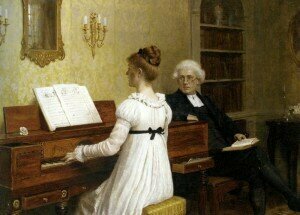
The Piano Lesson – Edmund Blair Leighton (1853-1922)
Teaching adults can be enjoyable, stimulating and challenging, and requires a slightly different approach from teaching children and teenagers. Adults often come to piano lessons with pre-conceived ideas about playing the piano and their own abilities, ideas which may have been inculcated in them from a young age by a dogmatic teacher or pushy parent, and can be hard to shift. Some are fiercely self-critical; others have unrealistic expectations about their ability and progress; and most have issues with confidence and playing in front of other people. Elderly adult students may have health issues such as arthritis, which may impede their piano playing, and while the mind may be eager the body may not be quite so flexible. In such cases, it is important to help the student find the kind of repertoire which suits them physically as well as emotionally.
Adult learners often display a very high level of commitment, largely because they have made the decision to take up piano lessons because they want to. Nobody has told them to do it, and they are paying for the lessons themselves. They are keen for personal fulfillment or a challenge or new focus, and many are conscientious about lesson attendance and practising. Yet they can also feel frustrated if their day job or the exigencies of family life intrude on their time at the piano. One of the key roles of the teacher is to offer advice on practising to enable the adult student to practise efficiently between lessons, even if they have limited time, and to tailor lessons to what is achievable given their other commitments. This can help overcome feelings of frustration at not being able to fit in practising while encouraging them to stay focused on the task in hand. Some adult students have very regular practise schedules and unsurprisingly these are the students who tend to make more noticeable and faster progress.
Confidence is nearly always a significant issue amongst adult learners, even those who play at an advanced level. The decision to take piano lessons as an adult is an act of great courage, and a good teacher of adults understands and respects this, and appreciates the fear that lurks on its flip side. Feelings of inadequacy or anxiety about playing in front of a teacher often stem from childhood experiences – a demanding parent with unrealistic expectations or the perfectionist attitude of a teacher, the memory of a bungled performance or a failed exam. A good teacher will be sympathetic and non-judgmental, and will do his/her best to make the student feel comfortable, encouraging them to play through any errors and not to worry about giving a perfect performance but rather to focus on communicating the music with colour and expression. Taking adults back a few stages to easier repertoire can be helpful too: this should never be seen as an “easy option” but rather an exercise in improving confidence and learning how to make one’s music very secure so that one can play with fluency and confidence. Understanding the physiological aspects of anxiety, which are common to all of us to a greater or lesser degree, can also help adult learners manage their nerves.
Some adult learners are keen to take grade exams as a means by which to benchmark their progress and for the thrill of a challenge, others are happy to play for pleasure and one of the nicest aspects of being an adult learner is the freedom to select whatever repertoire one wishes to play. This does, however, lead to some arriving at lessons with music which is beyond their current capabilities, and so the teacher must be adept at managing expectations without discouraging the student. Sometimes it is possible to find simplified versions of the pieces in question, or the teacher will suggest good alternative. Fundamentally, one is there to support and inspire, not to question the student’s motivation or discourage them, and getting them playing and gaining pleasure from their playing, rather than spending time on dull exercises or technical work, is at the heart of the teacher of adults’ role. It’s not about quantity of notes or notching up grade exams, but the joy of music making and the fulfillment of personal goals.
Debussy: Etude No. 1 Pour les Cinq Doigts
Just as with younger students, the choice of teacher is very important to the adult learner, and a teacher with whom one feels comfortable is crucial to one’s progress – and vice versa. Every student is different and a good teacher is adept at structuring lessons to suit each individual’s needs and ability. Some adults simply want someone to talk to, and the music becomes secondary to the idea of having someone’s undivided attention and positive or kindly feedback once a week. At £45 an hour, it’s a relatively cheap form of therapy! Teaching is a responsibility, at whatever level one teaches or the age of one’s students, and mutual respect creates positive interaction and conversation. It can be an intense and long-standing relationship, one which starts as a professional business transaction and develops into a rewarding friendship which benefits both student and teacher.
Stravinsky: Les Cinq Doigts




